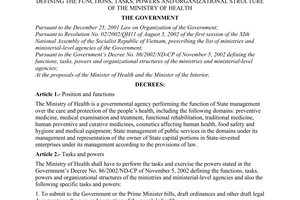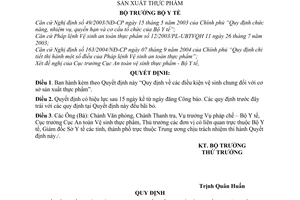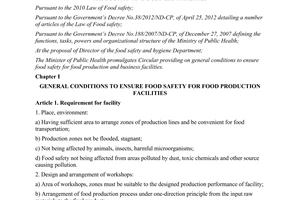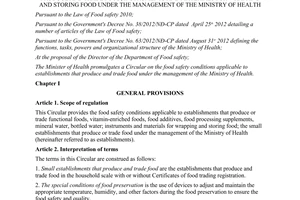Decision No. 39/2005/QD-BYT on promulgating provision on general hygienic đã được thay thế bởi Circular No. 15/2012/TT-BYT providing on general conditions to ensure food safet và được áp dụng kể từ ngày 01/11/2012.
Nội dung toàn văn Decision No. 39/2005/QD-BYT on promulgating provision on general hygienic
|
MINISTRY
OF HEALTH |
SOCIALIST
REPUBLIC OF VIET NAM |
|
No.: 39/2005/QD-BYT |
Hanoi, November 28, 2005 |
DECISION
ON PROMULGATING PROVISION ON GENERAL HYGIENIC CONDITIONS FOR FOOD PRODUCTION ESTABLISHMENTS
MINISTER OF HEALTH
Pursuant to Decree No.49/2003/ND-CP dated May 15, 2003 of the Government on “functions, tasks, powers and organizational structure of the Ministry of Health”;
Pursuant to the Ordinance on Hygiene - Food Safety No.12/2003/PL-UBTVQH 11 dated July 26, 2003;
Pursuant to Decree No.163/2004/ND-CP dated September 07, 2004 of the Government “Detailing the implementation of a number of Articles of the Ordinance on Hygiene - Food Safety”;
At the proposal of Director of Department for Safety and Food Hygiene - the Ministry of Health,
DECIDES:
Article 1. Issue together with this Decision the "Provision on the general hygienic conditions for food production establishments".
Article 2. The Decision takes effect 15 days after its publication in the Official Gazette.
The previous regulations contrary to the provisions in this Decision are now annulled.
Article 3. Mr. (Ms.): Chief Office, Chief Inspector, Head of Legal Department - Ministry of Health, Director of Department of Safety and Food Hygiene, heads of concerned units directly under the Ministry of Health, Directors of Health Departments of the provinces and centrally-run cities are responsible for the implementation of this Decision./.
|
|
FOR
MINISTER |
PROVISIONS
ON GENERAL HYGIENIC CONDITIONS FOR FOOD PRODUCTION
ESTABLISHMENTS
(issuing together with Decision No: 39/2005/QD-BYT dated November 28, 2005
of Minister of Health)
Chapter 1:
CONDITIONS FOR THE ESTABLISHMENTS
Article 1. Location and environment
1. Selection of the location to build establishment producting, processing food should be considered potential sources of contamination affecting food products. Not to place the establishment at the place in which, after considering the protective measures, it is still a threat to food safety.
2. Food manufacturing establishments must be located away from:
a) The areas where having environmental pollution and the industrial activities, living activities likely to cause food contamination.
b) The areas prone to water retention, flood, unless taking protective measures, prevention effectively.
c) The areas which are susceptible to pest damage; areas of solid or liquid wastes which can not remove them effectively.
3. Internal roads in the food establishment must be constructed to ensure hygienic standards, have good, self-contained drainage, not causing pollution, and ensure hygiene.
4. The establishment’s location should ensure sufficient clean water resources and convenient transportation.
Article 2. Requirements on design and arrangement of workshops
1. The area of production, processing of food must be designed according to one way rules from inputs to finished products to avoid contamination.
2. There is a gap between production area and non-production area, between the area receiving raw material, preliminarily treating, processing, packaging, warehousing, toilets, changing the clothes, canteen to avoid cross-contamination.
3. Storage containing and storing food of the establishment producting, trading food must be designed consistent with the requirements of each type of food and prevent the entry of insects and pests.
4. Design, allocation of workshop must be consistent with the technology and product categories, prevented cross contamination of food between stages of production as well as manipulation, processing and handling of food.
Article 3. Workshop structure
1. Warehouses, workshops and equipment are necessary to be arranged appropriate and convenient for the process of production, processing of food, easy to apply sanitary treatment measure.
2. Ceiling: bright colors made of waterproof materials, no cracks, prevented mold and stagnant water and dirt.
3. Floors: bright colors made of waterproof material, easily cleaned, non-slip, non-toxic for food, easy to clean, disinfect and good drainage.
4. Wall and wall’s corner: the wall must be flat, the corners must be rounded, bright colors, not causing pollution for food, waterproofed, easily cleaned and disinfected.
5. Doors: smooth, waterproof, preferably self-closing, opening, and closed. For the production establishment of packaged, tinned foods, it must be designed the place to put disinfected water for soaking boots before entering in and going out.
6. Window: must be easy to clean and designed to limit dust to a minimum level. At the necessary place, it must have protective net against intrusion of insects and animals; protective net must be convenient for regular cleaning.
7. The surface in direct contact with food: must be sustainable, easy to clean, easy to maintain, and disinfect; must be made of smooth material, waterproof, not contaminated to food, not eroded by the detergents and disinfectants in the normal conditions.
8. Ventilation system:
a) The ventilation system must be in accordance with specific production and business of the establishments, to prevent, restrict to a minimum level of the risk of food contamination by air or water condensation.
b) The direction of the ventilation system must ensure that the wind is not blown from the contaminated areas to the clean areas.
c) The ventilation system must be designed safely, for easy maintenance and inspection, with protective net by stainless materials, easy to disassemble for cleaning.
9. Lighting system:
a) It needs to provide adequate natural or artificial lighting (not less than 200 lux) for easily carrying out manipulation. Light intensity must suit to the nature of manipulation.
b) The light source should be shielded safely to avoid breaking and in the event of breakage, secure that the fragments do not fall into food.
10. Tools containing waste and inedible items:
a) It must be made of materials less damaged, be tight, with lids, to avoid the entry of animals, and are often washed.
b) Containers of hazardous substances must be specially designed, distinctively to avoid confusion when used, as needed they can be locked to prevent contamination of food caused by intentional or unintentional act.
Article 4. Water supply system
1. Water supply system must be adequate and have the means to store and distribute water, control temperature to ensure the safety and suitability in the production and processing of food.
2. Water used for food processing should be clean and not containing other contaminants to ensure safety and hygiene standards for drinking water and living water in accordance with provisions of the Ministry of Health.
3. Manufacturing establishments must have adequate clean water, enough pressure to provide for the process of cleaning, processing of food. Equipment containing water must be designed suitably for storage and hygienic use.
4. If using recovered water, it must be handled and maintained so as to ensure safety, not causing food contamination. The process must be controlled by effective measures.
Article 5. The system of ice provision
Ice used for drinking and food preservation must be produced from clean water and must be preserved and transported under sanitary regulations of the Ministry of Health.
Article 6. Steam supply system
1. It must make sure cleaning, safety, not causing pollution to food.
2. Steam used directly to produce food or contact with food must be hygienic and suitable to the use purpose and not harmful to human health.
3. Water used for steam production, refrigeration, fire protection and fighting, or used for other purposes must have separate pipelines, separate colors painted for easily differentiating and not to connect to the water system used for production and processing of foodstuffs.
Article 7. Compressed air
In the case of using compressed air, compressed air must be clean, safe, not cause pollution to food.
Article 8. Waste disposal system
1. Drainage system and waste dumping facilities must be designed and arranged to avoid the risk of contamination of food or contaminating clean water supplies used for food processing.
2. Design separate doors for taking the waste and garbage.
Article 9. Room for changing labor protection clothing
It must have separate rooms, reasonably designed for staffs to dress labor protection clothing before starting the work.
Article 10. Toilets
1. The toilet system must be adequate, which is arranged in convenient location for everyone in the establishment and have adequate equipment to ensure hygiene.
Averagely, it must have at least 01 toilet for 25 people.
2. Toilet area must have lighting and ventilation, water drainage system to easily remove the waste and ensure hygiene. Toilets should be constructed so as the main wind direction does not blow from the toilet area to the area of processing, storage, and sale of food.
3. Toilet area must be completely isolated and its door is not directed to the area of processing, preservation of food and must have hand washing basins; the instruction sign "Wash your hands after going out of the toilet" located at the visible location right after opening toilet’s door.
Chapter 2:
CONDITIONS FOR EQUIPMENT, TOOLS
Article 11. General requirements
1. Equipment and instruments in contact with food must be designed and made safely, in accordance with the requirements of the products, easy to clean, disinfect and maintain.
2. It must be made of non-toxic materials or of materials not polluting products. In case of need, it must be sustainable, portable, removable, disassembled for maintenance, cleaning, disinfection, monitoring of the risk of food safety.
Article 12. Means of hand washing and disinfection
1. It must have sufficient equipment of hand washing and disinfection in the convenient locations in the food processing sector.
2. The place of hand washing must provide adequate clean water, soap, and hand towels of once use or hand dryer.
3. Averagely, it must have a hand washing sink for at least 50 workers and it must have at least a hand washing sink for one workshop.
Article 13. Detergent
1. The substances used for cleaning and sterilizing food containers must be contained in easily identifiable packaging and have manuals in accordance with its specification.
2. The detergent should be put separately from area for processing and preservation of food.
3. Only using detergents of food containers and disinfectants permitted by the Health Ministry.
Article 14. Equipment of prevention and combat of insects, pests
It must use the stainless materials, easy to disassemble for cleaning, designed suitably to ensure effective prevention of insects and pests.
Article 15. Equipment, tools of quality monitoring
1. In addition to these general requirements, equipment used for heating, processing heat, cooling, storing, or freezing food should be designed so as to rapidly achieve the temperature as required by food to ensure safety and suitability of food and to maintain that temperature.
2. Equipment must be designed to monitor and control the temperature. At the necessary places, it must have the means to control and monitor air humidity, air flow and any other parameters affecting the safety and suitability of food.
Article 16. Equipment, tools of processing, packaging, storing, transporting
1. It must be made from nontoxic materials without causing odor compared to the initial taste of food, without absorbing, contaminating to food, being corroded, and that may avoid dust, insects and other pollution sources.
2. The use of new packaging materials must be evaluated and permitted by the Ministry of Health.
3. Prohibited to pack foods in the containers which are likely to cause poisoning, harm, not ensuring quality and safety of food.
4. Storage and transportation of food must be ensured safety, consistent with the characteristics of each type of food.
Chapter 3:
CONDITIONS FOR HUMAN
Article 17. Knowledge of hygiene and food safety of the persons producing and trading food
Persons directly involved in production, processing and sale of food must study knowledge of hygiene and food safety in accordance with provisions and have the certificate that have attended training in knowledge of hygiene and food safety issued by competent authorities, each year, they must additional learning and knowledge updating.
Article 18. Health of the persons producing and trading food
1. The persons who directly participate in production and sales of food must have certificates of eligibility for health in accordance with provisions of the Ministry of Health.
2. Medical examination and growth of stool to find healthy people of pre-employment and periodically made least once a year.
3. Those who are suffering from infectious diseases listed provided for by the Ministry of Health are not participated directly in the production or processing of food (tuberculosis, dysentery, typhoid, diarrhea, cholera, urine incontinence, fecal incontinence, hepatitis infection, rhinitis, throat pus, skin diseases, healthy people carrying the bacteria that cause intestinal diseases).
4. The medical examinations must be performed in medical institutions from district level upwards.
Article 19. Hygiene practices of the persons producing and trading food
1. Those who directly participate in production and sales of food must comply with the following requirements:
a) Wearing specific outfits when preparing or selling food. In addition, for the necessary cases, it must wear hats and gloves or clean masks.
b) Keeping nails short, clean, and not to wear jewelry when in direct contact with ready to eat food.
c) Not to eat in the food production sector.
d) Not to smoke, spit, sneeze or cough, chew, laugh loudly, wear jewelry, watches, or other objects in contact with safely unprotected food.
2. Those who directly participate in production of food must comply with "good hand hygiene practice":
a) Washing your hands after: going into the toilets, contacting with raw food, blowing nose, touching garbage, scratching, winkling nostrils or touching body parts, clothes, smoking, touching animals after each time of break.
b) Washing hands before preparing, in contact with food.
c) Drying hands after washing with disposable sanitary pads, clean towel, or air dryer, not to dry into the clothes, skirts, aprons.
d) Washing hands carefully with soap and clean water (including palms, back of hands, wrists, fingers’ slots, the nails’ folds).
đ) Not to let the fingernails long, if there are scratches on the hands and fingers, they should be bandaged with waterproof gauze and gloves as in contact with food.
3. The food production establishments perform fully all the conditions specified in this provision for two consecutive years or more may request the competent health authority to certify "Good Hygiene Practice." Certificates of good hygiene practice are valid for two years after its signing date.
Article 20. For visitors
a) Not being incidence of acute respiratory disease.
b) They must wear protective clothing and full implementation of the provisions on personal hygiene.
------------------------------------------------------------------------------------------------------
This translation is made by LawSoft and
for reference purposes only. Its copyright is owned by LawSoft
and protected under Clause 2, Article 14 of the Law on Intellectual Property.Your comments are always welcomed





